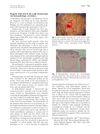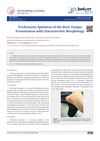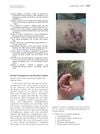 January 2018 in “Springer eBooks”
January 2018 in “Springer eBooks” Terbinafine is the most effective medicine for fungal nail infections, especially for diabetics and those with weak immune systems.
 March 2014 in “Journal of The American Academy of Dermatology”
March 2014 in “Journal of The American Academy of Dermatology” The document lists various dermatology topics, treatments, and diagnostic methods.
 July 2003 in “British Journal of Dermatology”
July 2003 in “British Journal of Dermatology” Some skin conditions are associated with other serious diseases, and office microscopy may miss many fungal infections.
 May 2023 in “Journal of The American Academy of Dermatology”
May 2023 in “Journal of The American Academy of Dermatology” The document's conclusion cannot be provided because the document is not available to parse.
 1 citations,
May 2012 in “Hair transplant forum international”
1 citations,
May 2012 in “Hair transplant forum international” Hair loss in men may be caused by inflammation triggered by hormones, and treatments reducing inflammation could potentially promote hair growth.
 April 2023 in “Authorea (Authorea)”
April 2023 in “Authorea (Authorea)” Hair transplantation can improve scars after removing a rare skin cancer.
 May 2017 in “InTech eBooks”
May 2017 in “InTech eBooks” Trichoscopy and trichogram are useful for diagnosing hair and scalp conditions.
 41 citations,
June 2003 in “Journal of The American Academy of Dermatology”
41 citations,
June 2003 in “Journal of The American Academy of Dermatology” Long-term minoxidil use can cause pseudoacromegaly, but stopping it improves symptoms.
 14 citations,
January 2016 in “Elsevier eBooks”
14 citations,
January 2016 in “Elsevier eBooks” Liposomes improve the delivery and effectiveness of cosmetic ingredients but face challenges like cost and stability.
60 citations,
August 2009 in “Journal of the American Academy of Dermatology” The term "porokeratotic adnexal ostial nevus" is proposed to unify overlapping skin conditions involving eccrine and hair follicles.
6 citations,
January 2015 in “Indian Dermatology Online Journal” PEODDN is a rare skin disorder with limited treatment options, best treated with laser therapy.
4 citations,
January 2019 in “Indian Dermatology Online Journal” The term "Porokeratotic Adnexal Ostial Nevus" is suggested as a more appropriate name.
 17 citations,
September 2010 in “Pediatric dermatology”
17 citations,
September 2010 in “Pediatric dermatology” A 15-year-old with KID syndrome developed a rare skin condition called PEHFN.
 121 citations,
January 1991 in “Acta dermato-venereologica”
121 citations,
January 1991 in “Acta dermato-venereologica” Terbinafine quickly builds up in skin and hair, staying effective for over 3 weeks.
 60 citations,
October 2010 in “Journal of the American Academy of Dermatology”
60 citations,
October 2010 in “Journal of the American Academy of Dermatology” Small white dots on the scalp seen with a dermoscope correspond to sweat ducts and vary with different hair disorders.
 24 citations,
September 1985 in “Journal of The American Academy of Dermatology”
24 citations,
September 1985 in “Journal of The American Academy of Dermatology” The report suggests a possible link between hair loss and hidden scalp tumors but states more evidence is needed to confirm this.
 10 citations,
August 1991 in “PubMed”
10 citations,
August 1991 in “PubMed” Inflammation, possibly triggered by a specific bacteria and activated by UV radiation, may contribute to male pattern baldness.
4 citations,
December 1994 in “PubMed” A woman’s skin bumps healed almost completely with tretinoin cream after a leg infection.
 16 citations,
December 2006 in “International Journal of Dermatology”
16 citations,
December 2006 in “International Journal of Dermatology” A woman died from cancer that spread from a long-standing cyst on her abdomen.
 4 citations,
January 2014 in “Indian Dermatology Online Journal”
4 citations,
January 2014 in “Indian Dermatology Online Journal” Case reports are important in medical science for discovering drugs and identifying rare conditions, despite their limitations.
 4 citations,
June 2005 in “British Journal of Dermatology”
4 citations,
June 2005 in “British Journal of Dermatology” People often underestimate hair loss severity, with fewer seeking treatment, and it's more distressing for women.
 May 2020 in “JOJ Dermatology & Cosmetics”
May 2020 in “JOJ Dermatology & Cosmetics” A rare skin condition usually on the face was found on a man's heel.
 April 2018 in “Nasza Dermatologia Online”
April 2018 in “Nasza Dermatologia Online” People with Down's syndrome are more likely to have syringomas.

A 72-year-old man was diagnosed with a rare skin form of Rosai-Dorfman disease after years of misdiagnosis.
 July 2011 in “British Journal of Dermatology”
July 2011 in “British Journal of Dermatology” Dermatologists give better information on pathology forms, hypersensitivity vasculitis is a common skin issue, misdiagnoses can occur, and various skin conditions are linked to loss of elastin or genetic factors.
 December 2006 in “International Journal of Dermatology”
December 2006 in “International Journal of Dermatology” Mnemonics with one letter are useful and easy to remember for learning dermatology.
 110 citations,
July 2017 in “Immunology”
110 citations,
July 2017 in “Immunology” Skin's Regulatory T cells are crucial for maintaining skin health and could be targeted to treat immune-related skin diseases and cancer.
 88 citations,
July 2014 in “Journal of the American Academy of Dermatology”
88 citations,
July 2014 in “Journal of the American Academy of Dermatology” Targeted cancer therapies often cause skin reactions, so dermatologists must manage these effects.
 82 citations,
June 2020 in “Inflammation Research”
82 citations,
June 2020 in “Inflammation Research” Skin problems in COVID-19 patients are rare and may be due to the body's complex immune response or blood clotting issues.
 80 citations,
March 2000 in “Journal of cutaneous pathology”
80 citations,
March 2000 in “Journal of cutaneous pathology” The VVG stain effectively differentiates scar tissue from normal skin and helps classify types of permanent alopecia.


























